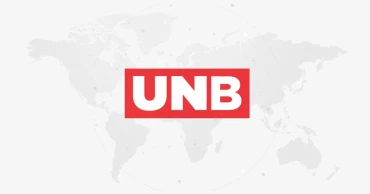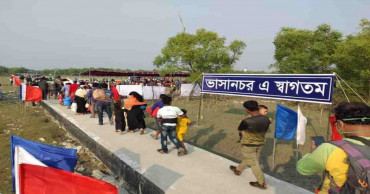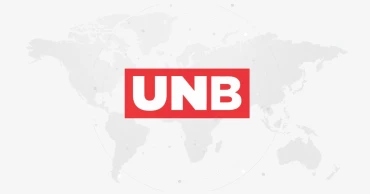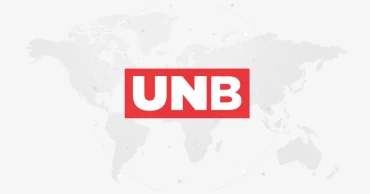Rohingya relocation
Over 1,500 more Rohingyas reach Bhasan Char
Another batch of 1,535 Rohingya refugees reached Bhasan Char in the 13th phase on Thursday.
This took the total population of Rohingya refugees at Ashrayan Kendra in Bhasan Char to 29,116.
The Rohingya men, women and children reached Bhasan Char by five naval ships in the noon, said Md Rafiqul Islam, Officer-in-Charge of Bhasan Char police station.
The Rohingyas were taken to their respective clusters on arrival, he said.
Read: PM vows to uplift Bangladesh to a developed nation
Earlier on Wednesday the 27 buses left Ukhia Degree College campus with the Rohingya citizens and reached Patenga in Chattogram around 10 pm.
Bangladesh is currently hosting over 1.1 million Rohingyas in camps in Cox’s Bazar and Bhasan Char. Most of them fled to this country since August 25, 2017, when the Myanmar military launched a brutal offensive targeting the Muslim ethnic minorities.
3 years ago
379 more Rohingyas reach Bhasan Char
A batch of 379 more Rohingyas reached Bhasan Char in the seventh phase under the supervision of Bangladesh Navy on Thursday afternoon.
Earlier on the day, 132 Rohingya men, 98 women and 149 children left Chittagong Port for Bhasan Char on a naval ship. These refugees are part of some 1,500 Rohingyas slated to be relocated to the island in this phase.
Md Shahidul Islam, superintendent of police (SP) in Noakhali, said: "The Rohingya people arrived in Bhasan Char at 3pm by naval ship Penguin. This is the first phase of Rohingya relocation in Bhasan Char since the United Nations has joined the effort."
According to Navy sources in Chattogram, 257 Rohingyas in the first group and 122 Rohingyas in the second group were brought from Ukhia in seven buses to the Navy's transit camp at Patenga Wednesday, where initial health check-ups were carried out and food was provided to them.
Read: Rohingya relocation: 1,500 more going to Bhasan Char in 7th phase
About 1,500-2,000 Rohingya men, women and children willing to go to Bhasan Char in the seventh phase gathered at the temporary transit point – Ukhiya Degree College – since Tuesday noon.
Jamalida Begum, leader of the Arakan Rohingya Society for Peace and Human Rights in Ukhia, said the residents of the camp in Ukhia feel unsafe after the killing of Rohingya leader Mohib Ullah and the gun attack on a madrasa in Rohingya camp. "So, most of the Rohingyas are willing to move to Bashan Char."
Meanwhile, Mohammad Rafiqul Islam, officer-in-charge of Bhasan Char Police, said about 1,500 Rohingya refugees are expected to reach Bhasan Char in the seventh phase. "All the preparations have been completed to receive them."
Read:UN arrival at Bhasan Char to ease better int’l coordination for repatriation: Japan
In six phases, over 18,500 Rohingyas have been shifted to Bhasan Char so far.
Bangladesh is now hosting over 1.1 million Rohingyas in camps in Cox’s Bazar and Bhasan Char. Most of them have come to this country since August 25, 2017, when the Myanmar military launched a brutal offensive targeting the Muslim ethnic minorities.
4 years ago
Rohingya relocation: 379 refugees leave for Bhasan Char
As many as 379 Rohingya refugees left Chattogram port for Bhasan Char on a naval ship Thursday morning. These refugees are part of some 1,500 Rohingyas slated to be relocated to the island in the seventh phase.
Shamsuddauja, additional refugee relief and repatriation commissioner in Cox's Bazar, said naval ship Penguin carrying the forcibly displaced Myanmar nationals left the port at 10am after an overnight stay at a military transit camp at Patenga in Chattogram.
Read: Rohingya relocation: 1,500 more going to Bhasan Char in 7th phase
According to Navy sources in Chattogram, 257 Rohingyas in the first group and 122 Rohingyas in the second group were brought from Ukhia in seven buses to the Navy's transit camp at Patenga Wednesday, where initial health check-ups were carried out and food was provided to them.
4 years ago
Rohingya relocation: 1,500 more going to Bhasan Char in 7th phase
Some 1,500 more Rohingyas are being relocated to the Bhasan Char Island in the seventh phase.
On the first day of the seventh phase, around 379 Rohingyas were taken to Chattogram from the camps in Cox’s Bazar in seven buses on Wednesday.
From there, the Rohingyas are scheduled to be sent to Bhasanchar on Thursday in a special navy ship.
Shamsuddauja, Additional Refugee Relief and Repatriation Commissioner in Cox's Bazar, said the Rohingyas willing to go to Bhasan Char were brought to the temporary transit point at Ukhiya Degree College ground and provided with necessary items, including food, water and medicine.
Read: Bhasan Char: an excellent example for a safe, sustainable, and resilient place for Rohingya relocation
4 years ago
Bhasan Char: an excellent example for a safe, sustainable, and resilient place for Rohingya relocation
The Bhasan Char is a near shore island in the Bay of Bengal located in the western side of Sandwip and it is separated from Sandwip Island by a 6-kmwide shallow channel. It is 60 km away from the mainland of Noakhali District (Fig. 1).The name of this newly emerged island (since 2003) was Thengar Char. Our Honorable Prime Minister Sheikh Hasina introduced the name of the island as Bhasan Char for the relocation of the forcefully displaced people of Rohingya Community of Myanmar sheltered at Kutupalong area of Teknaf in Cox’s Bazar.
Read: Bhasan Char much better than Cox’s Bazar camps: UNHCR
Geologically, Bangladesh is formed of the recent alluvial sediments (age: from 10,000 years to date) with few isolated Pleistocene terraces (age:from 10,000 years to 2.5 million years) that include Madhupur Tract in the central part, Barind Tract in the northwestern part and Lamai Hills in the eastern part of the country and the Tertiary (age: 2.5 million to 23 million years) eastern folded belts.The folded belts are composed of sandstone, siltstone, and shale/claystone. When these sedimentary rocks encountered at shallow depth below the alluvial sediments, we termed these rock layers as bedrock due to their high rock strength. The western most fold of the easter hill ranges is the Sitakund Anticlinal Structure. The convex part of the fold is called Anticline and the concave part of the fold is called syncline. The Sandwip Channel is a syncline in the western part of the Sitakund Anticline. The Sandwip Island including Bhasan Char is a part of a buried Anticline. Therefore, basement of Sandwip and Bhasan Char Island is strong due to the presence of bedrocks at shallow depth.The land area of the island is increasing day and day since its emergence in 2003 due to the accretion of sediments around the island from the Bay of Bengal.
BhasanChar was a virgin island before the Rohingya relocation. Bangladesh Navy have implemented a project to develop the infrastructures in the Bhasan Char for the relocation of Rohingya people.Now, all types of urban facilities area available in this island.Various preventive measure has been taken to protect the island as well its inhabitants.
To protect the bank erosion and inundation of the island from tidal waves and surges, three layers engineering protective measures have taken in the island (Fig. 2). The outer layer of the protective measures is the wave breakers. The second protective measure is low height embankment of gravels and geo-bags. Then, the natural mangrove forest and the inner last protective measure is the nine feet height embankment consisting of compacted and consolidated silt and clayey silt taken fromnearby sites. The height of the embankment to be raised up to nineteen feet in future keeping the slope ratio at 1:5 with 25 feet top width, which will use as road. Pavement of cement-concrete (CC) blocks will be placed on the outer slope, and planting and grassing will be done along the embankment to protect the erosion of the embankment from tidal surges and torrential rainfall of monsoon time. The embankment is constructed following standard procedure based the model prepared for 100 years return period of tidal storm surges.
Read:Section of global media, CSOs campaigning against Bhasan Char with distorted info: MoFA
4 years ago
Section of global media, CSOs campaigning against Bhasan Char with distorted info: MoFA
The government of Bangladesh has said a section of international media and Civil Society Organizations (CSOs) have been continuously campaigning against Bhasan Char and Rohingya relocation with distorted information.
Noting this with "great disappointment" the Ministry of Foreign Affairs on Tuesday said such campaign will undermine the magnanimous humanitarian gestures and the sincere efforts of Bangladesh.
"Excessive focus on temporary arrangement and undue criticism will only shift the focus from the permanent solution, which lies in repatriation to and reintegration of Rohingyas in Myanmar," said the MoFA in a media release.
Also read: Fully cooperating with ICJ to “ensure justice” for Rohingyas: NUG
During UNHCR senior officials tour to Bhasan Char, a large number of Rohingya gathered and launched a demonstration.
At one point, the crowd got agitated and in the process, some of the Rohingyas reportedly got minor injury, said the Ministry adding that once the delegation left the island, the situation normalized.
The two-member team from the UNHCR Headquarters in Geneva, comprising the Assistant High Commissioner for Protection and the Assistant High Commissioner for Operations, is currently visiting Bangladesh.
As a part of their protection-mandate, the team, accompanied by senior officials from the Ministry of Foreign Affairs, visited Bhasan Char on Monday.
The crowd had "free and frank interactions" with the AHCs and vented out their frustration and concerns over uncertainty vis-a-vis repatriation.
In absence of any progress in repatriation, they expressed desperation to get out of the present situation and requested to consider relocation to a third country, said the Ministry.
The Rohingyas demanded UN’s presence in Bhasan Char to ensure facilities such as education, livelihood activities, skill development etc, MoFA said.
Also read: UNHCR seeks adequate medical assistance for Rohingyas affected in Bhasan Char
They also confirmed to the AHCs that their relocation to Bhasan char was completely on a voluntary basis.
In recent times there have been a number of important visits to Bhashan Char including the visits of the OIC Assistant Secretary General, the 18-member UN team and most recently a group of Ambassadors.
During all these visits, the Rohingyas spontaneously and happily interacted with the visiting guests both in informal and formal settings.
The MoFA said Rohingyas are Myanmar nationals and any arrangement for them in Bangladesh; be it in Cox’s Bazar or in Bhasan Char; is purely on a temporary basis until they return to their country.
The Rohingyas also want to return to their homeland and all including the UNHCR need to work constructively to that end, said the Ministry.
The UN is expected to assume their responsibility and operate within their mandate taking into account the ground reality and concerns of the host community, Bangladesh says.
The Government of Bangladesh, on its part, is ready to address any realistic needs and concerns of the Rohingyas, said the Foreign Ministry.
4 years ago
Focusing on repatriation; Bhasan Char temporary plan: Shahriar
State Minister for Foreign Affairs M Shahriar Alam on Monday said Bangladesh has been able to establish two things in the Joint Response Plan (JRP) -- focus on Rohingya repatriation as a solution and making sure that Rohingya relocation to Bhasan Char is a temporary arrangement until repatriation takes place.
“We could reestablish two things in this JRP -- one is repatriation while another one is that we didn’t allow it (Bhasan Char) to become a permanent mechanism,” he told a small group of journalists, including the UNB correspondent, at his office.
He said the Bhasan Char issue will be there in the 2021 Joint Response Plan (JRP) but the details will be known after its formal launching tomorrow (Tuesday).
Shahriar said additional funding will be sought once the relocation process at Bhasan Char is completed as the government has a plan to shift 100,000 Rohingyas there from Cox’s Bazar’s congested camps.
So far, around 20,000 Rohingyas have been relocated to Bhasan Char under the government arrangement, said the State Minister.
He said the technical committee and the major contributors of the JRP said positive things about Bhasan Char.
When the UN will formally take up the responsibility of Rohingyas at Bhasan Char, it will further be evaluated how much funding will be required. “The final decision will be given by the UN.”
Shahriar said Bangladesh is focusing on repatriation and Bhasan Char is a temporary arrangement though many tried to make it a permanent mechanism.
“We could reestablish two things in this JRP – one is repatriation while another one is that we didn’t allow it (Bhasan Char) to become a permanent mechanism,” he said.
Meanwhile, US Ambassador to Bangladesh Earl R Miller met State Minister for Foreign Affairs M Shahriar Alam in the Ministry of Foreign Affairs.
They exchanged views on number of global and bilateral issues, including the launching of the annual Joint Response Plan (JRP) for the humanitarian operations for displaced Rohingyas, the Israeli-Palestinian conflict, the COVID situation and vaccine issue.
“They’re trying so that a senior US official can virtually join the launching event from Washington,” Shahriar said, adding that it is the reflection of US’ continuous support towards Bangladesh on repatriation and rehabilitation of Rohingyas.
The US Ambassador informed that the US would again be the largest contributor to the JRP for Rohingyas, which will be virtually launched and will attended by State Minister Shariar Alam.
He also stated that the US would continue its support to Bangladesh in bearing the burden of the displaced population.
The State Minister emphasised that sustainable repatriation of the Rohingyas remains as the priority of Bangladesh, and also emphasised receiving international support for the displaced Rohingyas relocated to Bhashan Char.
The US$943 million plan seeks to meet the needs of more than 880,000 Rohingya refugees and 472,000 Bangladeshis in the surrounding host communities in Cox’s Bazar district.
Most Rohingya refugees, some 740,000, fled violence in Myanmar’s Rakhine State in 2017.
UNHCR, the UN Refugee Agency, has called for renewed international commitment, support and solidarity for Rohingyas ahead of next Tuesday’s donors’ conference.
The 2021 JRP brings together the efforts of the Government of Bangladesh, and 134 UN agencies and NGO partners to target almost 1.4 million people this year, said UNHCR spokesperson Andrej Mahecic in Geneva recently.
Jointly co-hosted by the Government of Bangladesh, the International Organization for Migration (IOM) and UNHCR, the virtual 2021 JRP launch event will highlight the most immediate needs and ongoing humanitarian response.
The virtual 2021 JRP launch event is scheduled to run from 10:00am to 12:00 pm CEST Geneva (2:00pm – 4:00pm GMT+6 in Dhaka; 3:00pm – 5:00pm GMT+7 in Bangkok) on Tuesday (May 18). The event will be live streamed.
Last year, the United Nations appealed for more than US$1 billion to meet the needs of the Rohingya refugees and host communities in Cox’s Bazar District.
At the end of 2020, this appeal was just 59.4% funded.
"We stress that the international community must not only maintain support for refugees and their hosts, but also adapt to new and emerging needs and pursue the search for durable solutions," said the spokesperson.
More than 880,000 Rohingya refugees and 472,000 Bangladeshis in the surrounding host communities in Cox’s Bazar District are brought under the plan.
Also read: Miller discusses JRP, bilateral issues with Shahriar
Most Rohingya refugees, some 740,000, fled violence in Myanmar’s Rakhine State in 2017.
With the refugee crisis in its fourth year, Bangladesh needs robust and sustained international support to ensure the safety and wellbeing of stateless Rohingya refugees, said Mahecic.
This must not become a forgotten crisis. Both Rohingya refugees and Bangladesh, having generously hosted them for decades, must see the world standing with them, said the Spokesperson.
Adding to the complexity of this crisis, the Covid-19 pandemic has compounded vulnerabilities for refugees and host communities alike.
To date, the government of Bangladesh, with the support of the humanitarian community, has effectively managed the Covid-19 response and the spread of the disease in the Rohingya camps and surrounding areas, though the trajectory of the virus remains unpredictable, UNHCR said.
A coordinated and inclusive response has saved lives. However, it is critical to ensure the continued delivery of all humanitarian assistance and protection services.
The needs of Rohingya refugees reach beyond subsistence and physical safety. Refugees, like any other people, cannot be allowed to wait for years without access to education and options for a decent life and a meaningful future.
In order to mitigate the risks of people taking dangerous onward journeys, more must be done to ensure that refugees have hope in Bangladesh, and of a future back home in Myanmar.
Otherwise, they may increasingly risk such journeys by land or sea to find a solution elsewhere.
The search for durable solutions must remain focused on the voluntary, safe, dignified and sustainable return of Rohingya refugees to their homes in Myanmar, when conditions allow them to do so.
Also read: Ensure women’s participation in all peace initiatives: Shahriar
However, the ongoing crisis and political instability in Myanmar have added new layers of complexity to this challenge.
4 years ago
Bangladesh to demand 10pc of funds for Rohingyas in Bhasan Char: FM
Bangladesh will demand 10 percent of the funds that the humanitarian agencies raise in the name of Bangladesh and Rohingyas if they do not provide services to 100,000 Rohingyas to be shifted to Bhasan Char gradually, says Foreign Minister Dr AK Abdul Momen.
“Yes, they’ll have to pay because the funds are coming for Rohingyas. We’ll demand 10 percent of the fund if they don’t want to provide services to Rohingyas in Bhasan Char,” he told UNB in an interview at his residence on Friday.
Bangladesh is hosting over 1.1 million Rohingyas in Cox’s Bazar district and the government has a plan to shift 100,000 Rohingyas to Bhasan Char gradually which has already started.
The Foreign Minister said it should not be the headache of the humanitarian agencies where Rohingyas are living.
Also read: Rohingyas want to return to Myanmar; happy with Bhasan Char facilities
“It’s not a matter whether Rohingyas are living in Kutupalong, Cox’s Bazar, Barishal or in Bhasan Char. That shouldn’t be their headache. Their headache should be providing services to Rohingyas. They’re obligated to give them services wherever they stay,” Dr Momen said.
If the humanitarian agencies do not provide services to Rohingyas, Member States will not give funds which will put them in hardship, he said.
The Foreign Minister said they do not know how the UNHCR and other agencies spend the money though they raise funds in the name of Rohingyas and host communities.
Responding to a question on the technical team’s observation on Bhasan Char, the Foreign Minister said, “They’ve a very good and positive observation. Concisely, they’ve given a positive observation.”
He said they will hand over a 10-page report based on their observations and they have already submitted a two-page synopsis.
An 18-member UN delegation visited Bhasan Char in March to have a firsthand view of the housing facility for 100,000 Rohingyas.
Also read: Japan announces $1 million emergency aid for Rohingya camp fire victims
In their two-page synopsis, the team pointed out three points – education for Rohingya children, increasing heights of the embankments and better communication system.
Dr Momen said Bangladesh has no problem in providing education to Rohingyas but it has to be in Myanmar language.
“Rohingyas will have to go back to Myanmar. So, education in Myanmar curriculum will help Rohingyas integrate in their society easily once they return home,” he said.
About further increasing the heights of the embankments, Dr Momen said they will certainly do it for their own needs.
Also read: UN agencies ramp up response for Rohingya refugees after ‘unprecedented’ fire
4 years ago
Rohingyas want to return to Myanmar; happy with Bhasan Char facilities
The Rohingyas, now living in Bhasan Char, on Saturday interacted with the foreign diplomats and expressed their willingness to return to their homeland in Myanmar.
They conveyed their "high satisfaction" over the existing facilities in Bhasan Char, which they considered safe, secured crime-free compared to the congested camps in Cox’s Bazar.
The Rohingyas profusely thanked Prime Minister Sheikh Hasina and the Government of Bangladesh for the exemplary humanitarian support that have been extended to them since the mass exodus.
“I want my children to grow with their own national identity in their own country,” a Rohingya representative was quoted as conveying to the diplomats who visited Bhasan Char on Saturday.
Some Rohingyas underscored the need to expand learning facilities for children and provide them opportunities for farming and fishing which would help in keeping them active.
The Ministry of Foreign Affairs organised the day-long trip to Bhasan Char for the Heads of Missions of 10 Embassies/delegation - Turkey, the European Union (EU), the United States of America (USA), the United Kingdom (UK), France, Germany, Japan, Australia, Canada and the Netherlands.
Foreign Secretary (Senior Secretary) Masud Bin Momen, Disaster Management and Relief Secretary Md. Mohsin, Secretary Maritime Affairs Unit of the Ministry of Foreign Affairs Rear Admiral (Retd.) Md. Khurshed Alam, RRRC Shah Rezwan Hayat and other senior officials of the Government accompanied the team.
4 years ago
Rohingya relocation: 1,716 more going to Bhasan Char in 6th phase
More Rohingyas are being relocated to the Bhasan Char island in the sixth phase.
On the second day of the sixth phase, more than 1,700 Rohingyas were taken to Chattogram from the camps in Cox’s Bazar on Wednesday.
Cox's Bazar Additional Refugee Relief and Repatriation Commissioner Shamsuddauja Nayan said that 1,716 Rohingya men, women and children left for Chittagong on 25 buses in the morning and at noon.
Also read: Don’t worry about Rohingya relocation to Bhasan Char: Dhaka to UNHCR
Rohingyas willing to go to Bhasan Char were brought to the temporary transit point at Ukhiya Degree College ground and given necessary items including food, water and medicine.
They would be taken to Noakhali’s Bhasan Char from Chattogram’s Patenga under the Navy’s management.
Also read: Don't undermine, misinterpret genuine efforts: Dhaka on Rohingya relocation
Earlier, on March 30, the first day of the sixth phase, 2,495 Rohingyas reached Chattogram for Bhasan Char.
In five previous phases, over 14,000 Rohingyas were shifted to Bhasan Char from the camps in Cox's Bazar.
4 years ago

.jpg)
.jpg)
.jpg)



.jpg)
.jpg)




